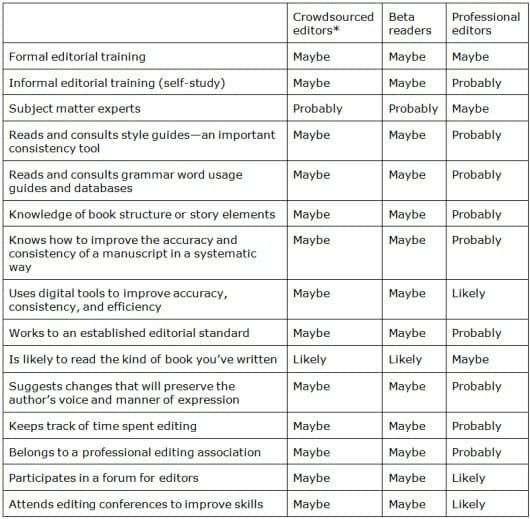By Corina Koch MacLeod and Carla Douglas
Crowdsourced editing is a new term, but the concept has been around for a while. Writers have always shared their works-in-progress with other writers in exchange for criticism, in much the same way many writers now use beta readers for feedback. And there’s the practice—which we have only heard about and which is frowned upon by editors, obviously—in which a writer sends a different segment of a manuscript to a variety of editors with a request for a sample edit. With luck, the writer gets a full manuscript edited by the crowd.
Recently though, the term crowdsourced has become more clearly defined. Where in the past (and in the examples above), crowdsourced editing relied on the skills and expertise of writers and editors, now it is readers themselves who have become the crowd writers are turning to for advice.
What is Crowdsourced Editing?
Crowdsourced editing for a book looks something like crowdfunding for a book: each uses social media to invite interested readers to register their support for a book or to offer their opinions about its strengths and weaknesses. Indeed, the lines blur a little in some cases. For the UK crowdfunding site Unbound, for example, potential supporters read an author’s pitch and decide whether or not to back it, and in a sense they act as acquisitions editors in doing so.
More often, however, crowdsourced editing involves making editorial recommendations. Advance Editions—one publishing startup seeking to harness the talents of the crowd—outlines tips for its “reader-editors” this way:
[K]eep a note of anything you think could be improved. Have you spotted an error? Does something seem implausible? Do you know something about the subject that could help the author? Have you had a bright idea for something else the author could include?
With the broad use of beta readers, especially in the self-publishing community, it’s not surprising that the reader-editor might be similarly popular. Crowdsourced editing appeals to the indie do-it-yourself ethic. It’s collaborative and democratic, and it appears to thumb its nose at the status quo by giving readers a chance to be that last set of eyes on a manuscript.
Questions About Crowdsourced Editing
Who are the editors in the crowd? How is editing defined? What do the editors know about editing? Authors need to ask these important questions when seeking feedback on a book.
Beta Readers, Crowdsourced Editors and Professional Editors.
Who can edit a book? An ever increasing number of people can and do edit books. In this article, we’ll look at three kinds of editors:
- crowdsourced editors
- beta readers
- professional editors
What are the differences between crowdsourced editors, beta readers and professional editors? Are there differences? We think there are, and we’ve laid it out for you in the table below.
Definitions
Let’s begin by defining the terms. “Professional editors” invoice authors and get paid for their work. Editing is an unregulated profession, so it’s up to an author to determine if an editor has the knowledge and skills to help improve their book. Does that sound risky? You will take similar risks with crowdsourced editors and beta readers.
Beta readers and crowdsourced editors are volunteers. They are self-selected. They offer feedback on your book because they want to. They don’t get paid for their feedback, at least not in the way that professional editors do. That doesn’t mean they don’t get compensated (see below).
Comparing “Editors”
Because we cannot speak for all editors, we’ve tried to stay away from sweeping pronouncements. The qualifiers used below reflect our understanding of what crowdsourced editors, beta readers and professional editors may know and do. (Click to enlarge table.)
*Is there a difference between a crowdsourced editor and a beta reader? Does the difference lie in when in the process they come into the picture? Or is crowdsourced editor the new term for beta reader? Everything about publishing and self-publishing is in flux. This could be just one more instance of shifting ground.
Limitations of Crowdsourced Editing
Any method you choose to get your book edited will have limitations—things it can do, and things it can’t. What can crowdsourced editing best address? Content editing, fact checking, and big-picture editing might work best. This is where readers with knowledge of your subject or genre can quickly assess your information for clarity and accuracy or judge whether your novel is believable, credible and conforms to the conventions of the genre.
What kinds of editing may not work well when crowdsourced? Unless you can ensure that everyone is on the same page, copyediting and proofreading may not be the best or most efficient use of people’s editorial energies and time. In any manuscript there are countless details to keep track of, and a combination of knowledge, skills, tools and copyediting/proofreading experience produce the best results.
Tips for Successful Crowdsourced Editing
- Decide what kind of editing you can reasonably address. We think that content editing, fact checking and big-picture editing will work best for crowdsourced editing.
Will you address copyediting and proofreading? We think it’s best to consult a professional editor or proofreader for these kinds of editing. However, if you disagree with us, be sure to create a style sheet. Decisions about how you punctuate or capitalize certain words, for example, aren’t always cut-and-dried. They’re often style choices instead of a hard-and-fast rules. To determine your style choices, choose a dictionary that everyone will consult and a style guide that everyone will follow. Good luck! (Don’t say we didn’t warn you). - Don’t assign more than one task per person. If someone is reading for story structure and continuity, they shouldn’t also be looking for typos and formatting errors. They’ll perform all tasks badly.
- Decide what your standards will be. Everyone wants a book that’s professional and polished, but what exactly does that mean? Think about who will set these standards.
- Establish a system. Editing is more than a read-through. There are a lot of details to keep track of, and professional editors develop checklists to stay on track. Develop a checklist or list of questions to guide the editing process. Your crowdsourced editors will need to know what to look for and what to do when they find it.
- Decide how many editors you’ll use for the best outcome. There is a point at which too many cooks spoil the broth. Determine that number and stay beneath it. More input isn’t always better.
- Decide who will compile feedback and corrections and how feedback and corrections will be handled.
- Keep track of how much time it takes to produce a manuscript that meets your standard. Professional editors are always looking for ways to be more efficient while maintaining a high level of quality. They keep track of how much time it takes to do a job, and look for ways to spend less time on task without sacrificing quality.
- Think about how much work you are asking your crowd to perform. Is it reasonable to ask for this time commitment? What will you do in exchange, or how will you compensate them? Remember, too, that your chosen advisors are volunteers, and you can’t reasonably ask them to do more than they choose. (There might be instances when you want them to do less, too.)
- Prepare yourself mentally for the feedback you’ve asked for. Are you ready for the unvarnished truth? Decide what you’ll do with feedback you don’t agree with. Will you change your manuscript accordingly or discard the advice? You’ll then have to ask, why am I asking for opinions if I’m not prepared to implement suggestions?
What the Crowd Can Do For You
All this advice can force you to think more deeply about your writing, what you’re trying to say, and how well you’re expressing it. It might also point to harder questions: Whose book are you writing? Are you trying to please an audience or are you trying to be true to your own voice? It can be a fine line to walk.
Logic tells us that what the crowd produces might be a bit bland. In an effort to please everyone, you might end up with a book that’s pleasingly generic. So remember that this is your book, and that to stand out, it should have the stamp of your individual voice. Caution aside, the crowd can do a lot for a writer, if that writer is organized and informed, and has a system.

Corina Koch MacLeod and Carla Douglas of Beyond Paper Editing are Contributing Writers for The Book Designer.
They are also authors, copyeditors and proofreaders who work with and instruct self-publishing authors.
You can learn more about Corina and Carla here.
Photo: bigstockphoto.com


